Unit 2 I think that mooncakes are delicious!Section B (2a-2e)课件(共32张PPT,含内嵌视频) 人教版英语九年级全一册
文档属性
| 名称 | Unit 2 I think that mooncakes are delicious!Section B (2a-2e)课件(共32张PPT,含内嵌视频) 人教版英语九年级全一册 |
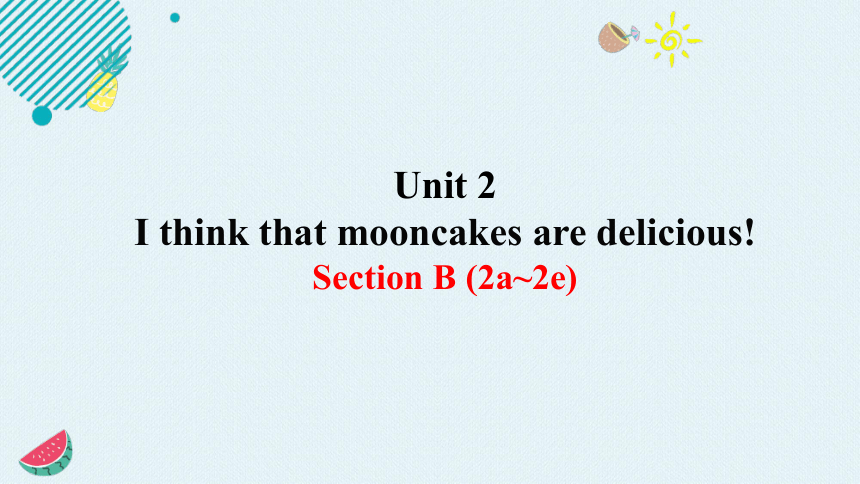
|
|
| 格式 | pptx | ||
| 文件大小 | 46.2MB | ||
| 资源类型 | 教案 | ||
| 版本资源 | 人教新目标(Go for it)版 | ||
| 科目 | 英语 | ||
| 更新时间 | 2024-07-21 00:00:00 | ||
图片预览

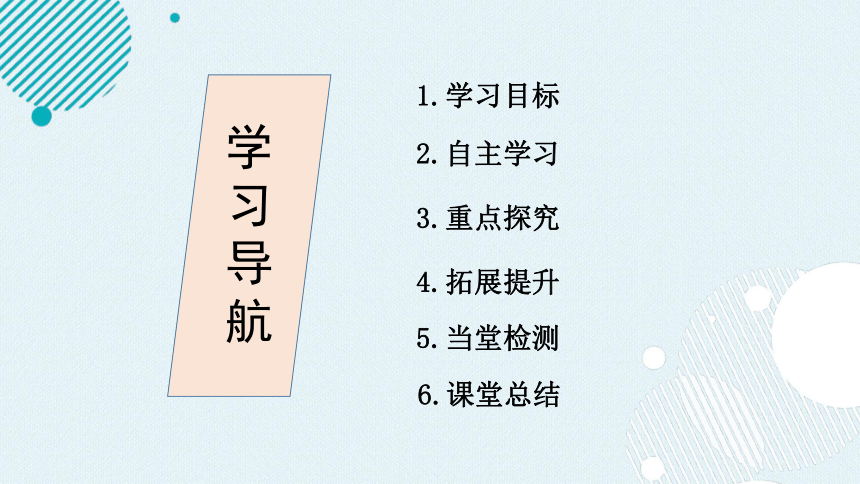

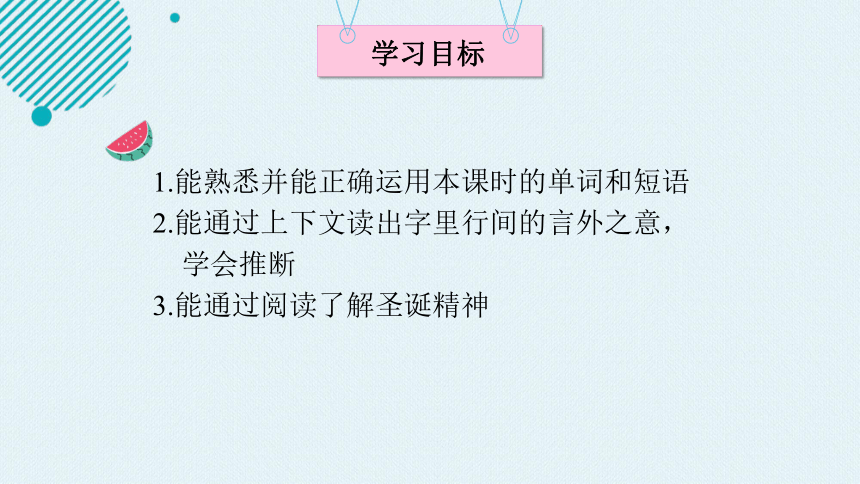
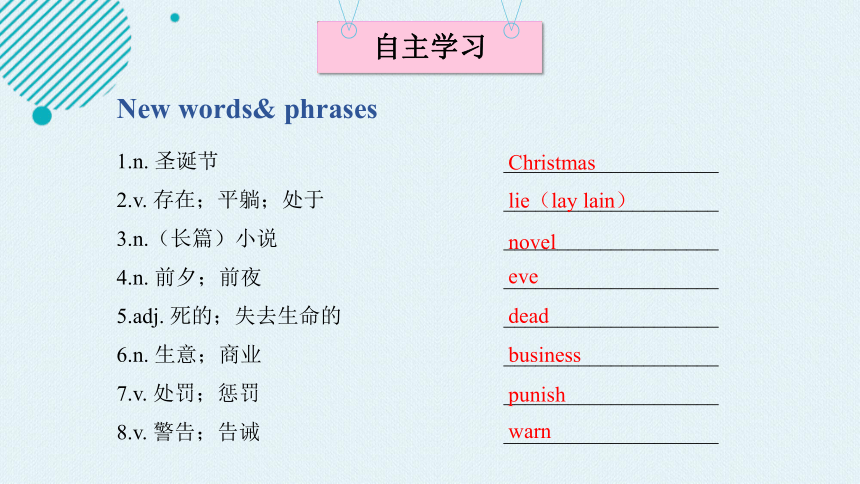
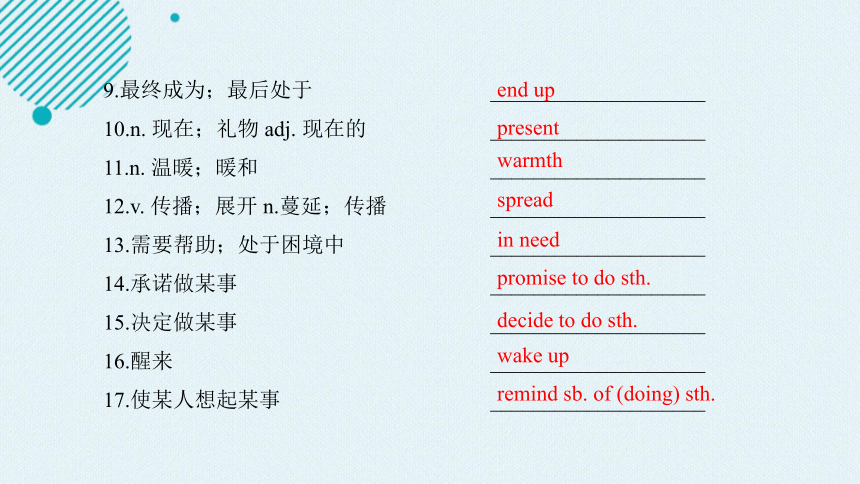
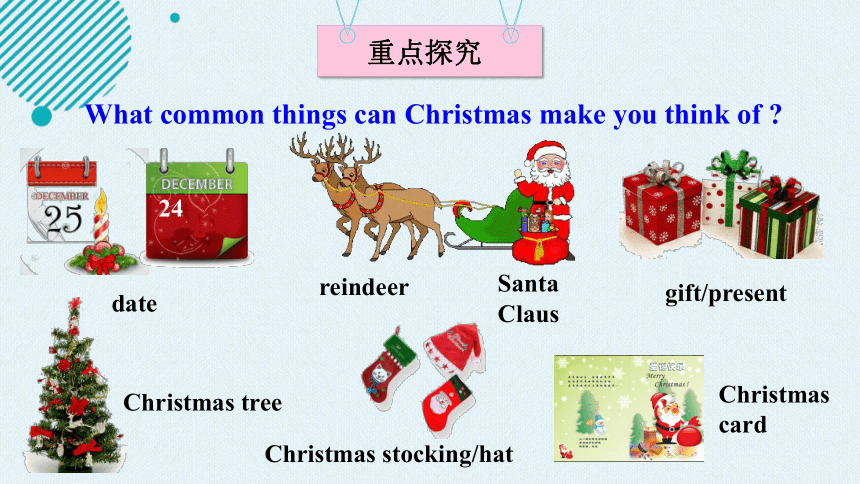
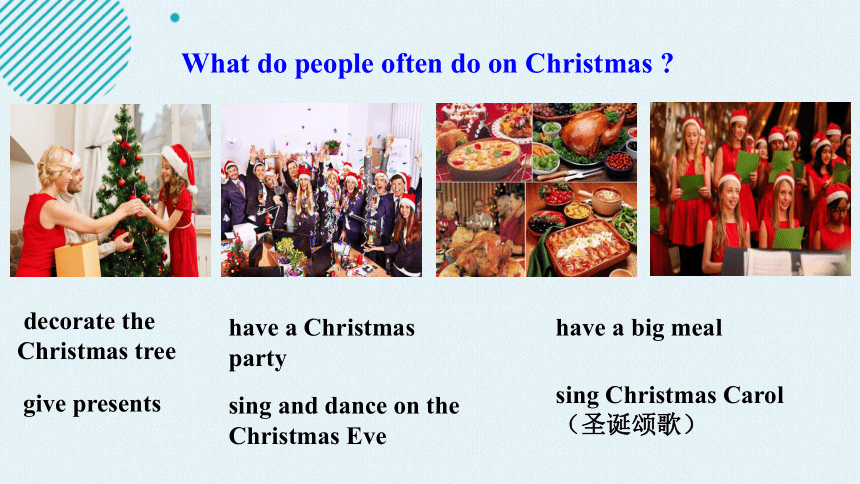
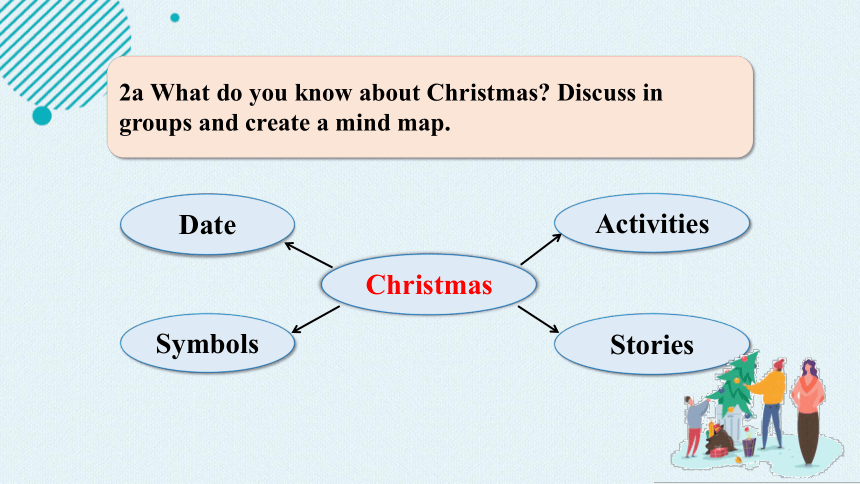
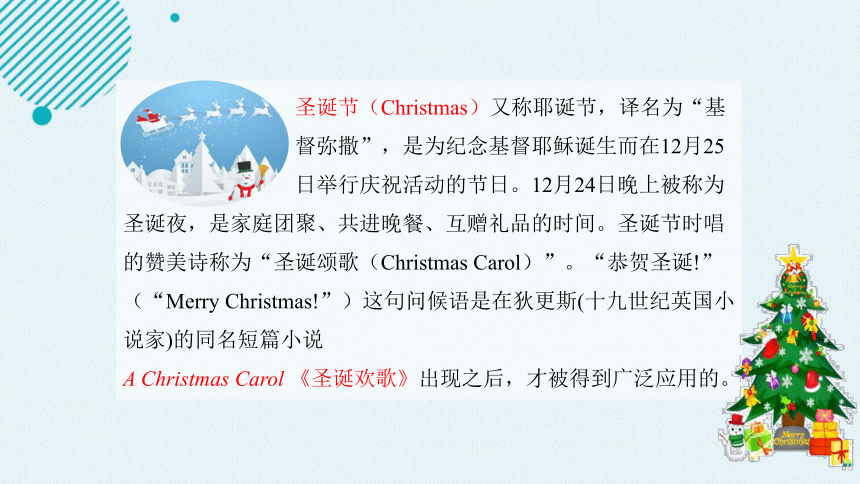
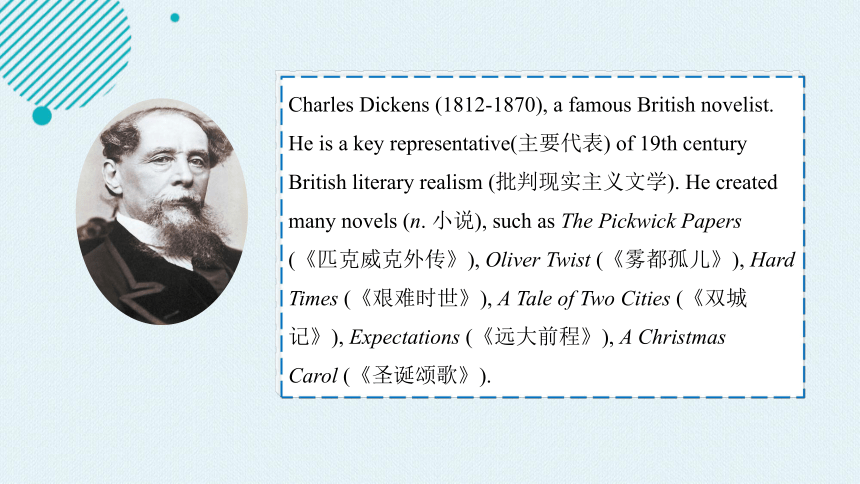
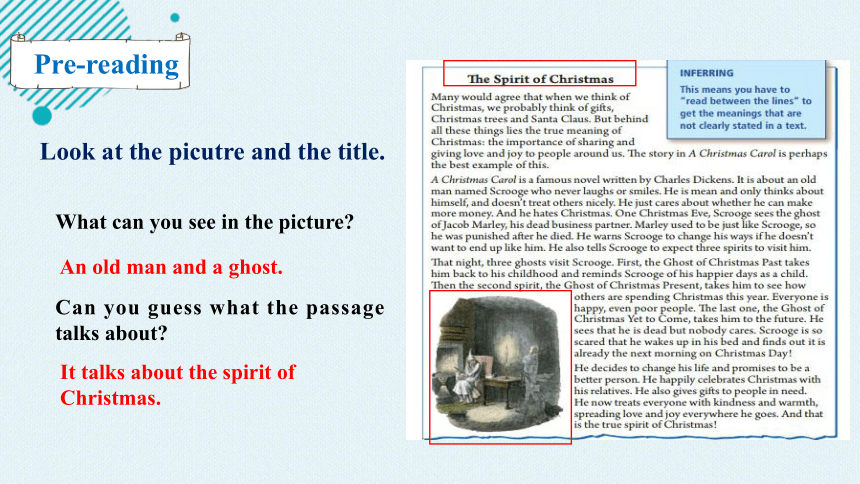
文档简介
(共32张PPT)
Unit 2
I think that mooncakes are delicious!
Section B (2a~2e)
1.学习目标
3.重点探究
2.自主学习
学习导航
5.当堂检测
6.课堂总结
4.拓展提升
新课导入
What do you know about Christmas
学习目标
1.能熟悉并能正确运用本课时的单词和短语
2.能通过上下文读出字里行间的言外之意,
学会推断
3.能通过阅读了解圣诞精神
自主学习
New words& phrases
1.n. 圣诞节 ____________________
2.v. 存在;平躺;处于 ____________________
3.n.(长篇)小说 ____________________
4.n. 前夕;前夜 ____________________
5.adj. 死的;失去生命的 ____________________
6.n. 生意;商业 ____________________
7.v. 处罚;惩罚 ____________________
8.v. 警告;告诫 ____________________
Christmas
lie(lay lain)
eve
novel
dead
business
punish
warn
9.最终成为;最后处于 ____________________
10.n. 现在;礼物 adj. 现在的 ____________________
11.n. 温暖;暖和 ____________________
12.v. 传播;展开 n.蔓延;传播 ____________________
13.需要帮助;处于困境中 ____________________
14.承诺做某事 ____________________
15.决定做某事 ____________________
16.醒来 ____________________
17.使某人想起某事 ____________________
end up
present
warmth
spread
in need
promise to do sth.
decide to do sth.
wake up
remind sb. of (doing) sth.
重点探究
Santa
Claus
reindeer
Christmas
card
Christmas tree
gift/present
What common things can Christmas make you think of
date
24
Christmas stocking/hat
What do people often do on Christmas
decorate the Christmas tree
have a Christmas party
have a big meal
give presents
sing and dance on the Christmas Eve
sing Christmas Carol(圣诞颂歌)
2a What do you know about Christmas Discuss in groups and create a mind map.
Christmas
Date
Symbols
Activities
Stories
圣诞节(Christmas)又称耶诞节,译名为“基
督弥撒”,是为纪念基督耶稣诞生而在12月25
日举行庆祝活动的节日。12月24日晚上被称为圣诞夜,是家庭团聚、共进晚餐、互赠礼品的时间。圣诞节时唱的赞美诗称为“圣诞颂歌(Christmas Carol)”。“恭贺圣诞!”(“Merry Christmas!”)这句问候语是在狄更斯(十九世纪英国小说家)的同名短篇小说
A Christmas Carol 《圣诞欢歌》出现之后,才被得到广泛应用的。
Charles Dickens (1812-1870), a famous British novelist. He is a key representative(主要代表) of 19th century British literary realism (批判现实主义文学). He created
many novels (n. 小说), such as The Pickwick Papers (《匹克威克外传》), Oliver Twist (《雾都孤儿》), Hard Times (《艰难时世》), A Tale of Two Cities (《双城记》), Expectations (《远大前程》), A Christmas
Carol (《圣诞颂歌》).
Pre-reading
Look at the picutre and the title.
What can you see in the picture
An old man and a ghost.
Can you guess what the passage talks about
It talks about the spirit of Christmas.
Fast reading strategy
快速阅读策略
Read for the meanings,
not for the details.
了解文章大意,
先不要注重细节。
Fast reading
Match the paragraphs with the main ideas.
Paragraph 1
Paragraph 2
Paragraph 3
Paragraph 4
The symbols and true meaning of Christmas.
Three Ghosts of Christmas visit Scrooge.
Scrooge changes himself.
Introduce Scrooge and Jacob Marley in A Christmas Carol.
Inferring
It means you have to “read between the lines” to get the meaning that are not clearly stated in a text.
所谓判断,就是你必须读出字里行间的言外之意,从而获知文中没有清晰表达出的意思。即把有关的文字作为已知部分,从中推断出未知部分。
2b Read the passage about Christmas and answer the questions.
1.What are the common things that people think of for Christmas
2. Who wrote A Christmas Carol
Gifts, Christmas trees and Santa Claus.
Careful reading
Charles Dickens wrote A Christmas Carol.
3. What is the true meaning or spirit of Christmas
The true spirit of Christmas is the importance of sharing and giving love and joy to people around us.
Read Paragraph 2 and answer the question.
1. Why does Scrooge hate Christmas
2. Does Scrooge have a lot of friends Why or why not
He is mean and only thinks about himself. He doesn’t treat others nicely. He just cares about whether he can make more money.
No, he doesn’t. Because he wasn’t nice to people and never laughs or smiles. He is mean and only thinks about himself.
3. Why was Jacob Marley punished after he died
4. Does Jacob Marley want to help Scrooge How do you know
He was punished because he wasn’t nice to others and only cared about money.
Yes, he does. Because Marley’s ghost tried to warn Scrooge to change his ways so as not to end up like him.
2c Read the passage again and complete the chart.
What does Scrooge see when he’s with… the Ghost of Christmas Past
the Ghost of Christmas Present
the Ghost of Christmas Yet to Come
his happier days as a child.
how others are spending Christmas.
he is dead ,but nobody cares.
Answer the questions.
1.What do the 3 ghosts stand for
2.Why does nobody care Scrooge’s death
3.How does he wake up on Christmas Day morning
They stands for past, present and future.
Because he doesn’t treat others nicely.
He is so scared.
Read Paragraph 4 and answer the question.
1. He happily celebrates Christmas with his relatives.
2. He gives gifts to people in need.
3. He treats everyone with kindness and warmth.
4. He spreads love and joy everywhere he goes.
celebrate
give
treat
spread
How did Scrooge change
mean
selfish
coldblooded
unfriendly
helpful
generous
Scrooge in the past:
Scrooge at present:
friendly
kindhearted
Unhappy,dark and hopeless
happy,bright and meaningful
dream
The spirit of Christmas
2d Answer the questions. Some answers need to be inferred.
5.How does Scrooge feel when he wakes up on Christmas Day
6.What does Scrooge do after seeing the three spirits
He feels very scared.
He happily celebrates Christmas with his relatives. He also gives gifts to people in need. He treats everyone with kindness and warmth, spreading love and joy everywhere he goes.
2e What do you think the three ghosts say to Scrooge when they visit him In groups of four, make a conversation between the three ghosts and Scrooge. Role-play the conversation in front of the class.
Characters:
A. Scrooge
B. Ghost of Christmas Past
C. Ghost of Christmas Present
D. Ghost of Christmas Yet to Come
E. Narrator (解说者)
拓展提升
Language points
1. It is about an old man named Scrooge who never laughs or smiles.
(1)named 在这里是过去分词,named Scrooge作后置定语,named 还可以换成called/with the name of ,如:
The boy called Li Lei is here.叫李雷的男孩在这儿。
I lent him the book with the name of Red Star Over China.
我把《红星照耀中国》这本书借给他了。
(2)who在这里引导一个定语从句。定语从句常用who/that作引导词代人,用which/that作引导词代物,如:
我有一只二十元的钢笔。I have a pen which/that is 20 yuan.
他就是我想找的人。He is the man who/that I want to find.
2. Marley used to be just like Scrooge, …
used to do sth. 曾经…;过去常常…
I used to go to the cinema, but I never have time now.
我过去经常去看电影,但现在再没有时间了。
【辨析】used to do sth. / be used to doing sth. / be used to do sth.
used to do sth. “过去常常”, 其后跟动词原形, 表示过去的习惯、经常发
生的动作或状态。
be used to doing sth. “习惯于做某事”, 其中to是介词, 后接名词或动名词。
e.g. The old man and his wife have been used to living a simple life.
be used to do sth. “被用来做某事”。
e.g.This computer is used to control all the machines.
3. He warns Scrooge to change his ways if he doesn’t want to end up like him.
warn v. 警告; 告诫
warn sb. (not) to do sth. 警告某人(不要)干某事
warn sb. of/about sth.提醒 / 警告某人注意某事
warn sb. (that)... 警告某人……
e.g. The police warned us not to go out at night.
警察警告我们晚上不要出去。
e.g. I have warned him that it is not allowed to park the car here.
end up 最终成为; 最后处于
end up with表示“以……结束”,其后可跟任何名词。
4. First, the Ghost of Christmas Past takes him back to his
childhood and reminds Scrooge of his happier days as a child.
remind v. 提醒,使记起,使想起
remind sb. of sb./sth.使某人回想起某人/某物
remind sb. to do sth提醒某人做某事
remind sb.+that...提醒某人...
e.g. Please remind me to write to my mother tomorrow.
请提醒我明天给我母亲写信。
May I remind you that time will soon be up
请允许我提醒你时间快到了?
It can remind you of a warm, sunny day.
它能让你想到一个温暖的晴天。
当堂检测
完成句子。
1.周老师因为杰克迟到而惩罚了他。
Mr Zhou ________ Jack for _______ late.
2. 妈妈警告我不要去摸那条狗。
My mother _______ me_______ _______ touch that dog.
3.我们必须做点什么来防止疾病的传播。
We must do something to prevent _______ _______ _______ the disease。
4.老板通常对那些为他工作的人刻薄小气。
Boss usually is _______ _______those who worked for him.
5.他的话让我想起了我的上一个假期。
His words _________me ________ my last holiday.
punished being
the spread of
warned not to
mean to
reminded of
课堂总结
Unit 2
Section B (2a~2e)
重点短语:
______________________________________________
______________________________________________
______________________________________________
______________________________________________
Inferring:
__________________________________
__________________________________
__________________________________
It means you have to “read between the lines” to get the meaning that are not clearly stated in a text.
end up
promise to do sth.
decide to do sth.
wake up
remind sb. of (doing) sth.
in need
think of
the importance of (doing) sth.
care about
make money
used to do sth.
Unit 2
I think that mooncakes are delicious!
Section B (2a~2e)
1.学习目标
3.重点探究
2.自主学习
学习导航
5.当堂检测
6.课堂总结
4.拓展提升
新课导入
What do you know about Christmas
学习目标
1.能熟悉并能正确运用本课时的单词和短语
2.能通过上下文读出字里行间的言外之意,
学会推断
3.能通过阅读了解圣诞精神
自主学习
New words& phrases
1.n. 圣诞节 ____________________
2.v. 存在;平躺;处于 ____________________
3.n.(长篇)小说 ____________________
4.n. 前夕;前夜 ____________________
5.adj. 死的;失去生命的 ____________________
6.n. 生意;商业 ____________________
7.v. 处罚;惩罚 ____________________
8.v. 警告;告诫 ____________________
Christmas
lie(lay lain)
eve
novel
dead
business
punish
warn
9.最终成为;最后处于 ____________________
10.n. 现在;礼物 adj. 现在的 ____________________
11.n. 温暖;暖和 ____________________
12.v. 传播;展开 n.蔓延;传播 ____________________
13.需要帮助;处于困境中 ____________________
14.承诺做某事 ____________________
15.决定做某事 ____________________
16.醒来 ____________________
17.使某人想起某事 ____________________
end up
present
warmth
spread
in need
promise to do sth.
decide to do sth.
wake up
remind sb. of (doing) sth.
重点探究
Santa
Claus
reindeer
Christmas
card
Christmas tree
gift/present
What common things can Christmas make you think of
date
24
Christmas stocking/hat
What do people often do on Christmas
decorate the Christmas tree
have a Christmas party
have a big meal
give presents
sing and dance on the Christmas Eve
sing Christmas Carol(圣诞颂歌)
2a What do you know about Christmas Discuss in groups and create a mind map.
Christmas
Date
Symbols
Activities
Stories
圣诞节(Christmas)又称耶诞节,译名为“基
督弥撒”,是为纪念基督耶稣诞生而在12月25
日举行庆祝活动的节日。12月24日晚上被称为圣诞夜,是家庭团聚、共进晚餐、互赠礼品的时间。圣诞节时唱的赞美诗称为“圣诞颂歌(Christmas Carol)”。“恭贺圣诞!”(“Merry Christmas!”)这句问候语是在狄更斯(十九世纪英国小说家)的同名短篇小说
A Christmas Carol 《圣诞欢歌》出现之后,才被得到广泛应用的。
Charles Dickens (1812-1870), a famous British novelist. He is a key representative(主要代表) of 19th century British literary realism (批判现实主义文学). He created
many novels (n. 小说), such as The Pickwick Papers (《匹克威克外传》), Oliver Twist (《雾都孤儿》), Hard Times (《艰难时世》), A Tale of Two Cities (《双城记》), Expectations (《远大前程》), A Christmas
Carol (《圣诞颂歌》).
Pre-reading
Look at the picutre and the title.
What can you see in the picture
An old man and a ghost.
Can you guess what the passage talks about
It talks about the spirit of Christmas.
Fast reading strategy
快速阅读策略
Read for the meanings,
not for the details.
了解文章大意,
先不要注重细节。
Fast reading
Match the paragraphs with the main ideas.
Paragraph 1
Paragraph 2
Paragraph 3
Paragraph 4
The symbols and true meaning of Christmas.
Three Ghosts of Christmas visit Scrooge.
Scrooge changes himself.
Introduce Scrooge and Jacob Marley in A Christmas Carol.
Inferring
It means you have to “read between the lines” to get the meaning that are not clearly stated in a text.
所谓判断,就是你必须读出字里行间的言外之意,从而获知文中没有清晰表达出的意思。即把有关的文字作为已知部分,从中推断出未知部分。
2b Read the passage about Christmas and answer the questions.
1.What are the common things that people think of for Christmas
2. Who wrote A Christmas Carol
Gifts, Christmas trees and Santa Claus.
Careful reading
Charles Dickens wrote A Christmas Carol.
3. What is the true meaning or spirit of Christmas
The true spirit of Christmas is the importance of sharing and giving love and joy to people around us.
Read Paragraph 2 and answer the question.
1. Why does Scrooge hate Christmas
2. Does Scrooge have a lot of friends Why or why not
He is mean and only thinks about himself. He doesn’t treat others nicely. He just cares about whether he can make more money.
No, he doesn’t. Because he wasn’t nice to people and never laughs or smiles. He is mean and only thinks about himself.
3. Why was Jacob Marley punished after he died
4. Does Jacob Marley want to help Scrooge How do you know
He was punished because he wasn’t nice to others and only cared about money.
Yes, he does. Because Marley’s ghost tried to warn Scrooge to change his ways so as not to end up like him.
2c Read the passage again and complete the chart.
What does Scrooge see when he’s with… the Ghost of Christmas Past
the Ghost of Christmas Present
the Ghost of Christmas Yet to Come
his happier days as a child.
how others are spending Christmas.
he is dead ,but nobody cares.
Answer the questions.
1.What do the 3 ghosts stand for
2.Why does nobody care Scrooge’s death
3.How does he wake up on Christmas Day morning
They stands for past, present and future.
Because he doesn’t treat others nicely.
He is so scared.
Read Paragraph 4 and answer the question.
1. He happily celebrates Christmas with his relatives.
2. He gives gifts to people in need.
3. He treats everyone with kindness and warmth.
4. He spreads love and joy everywhere he goes.
celebrate
give
treat
spread
How did Scrooge change
mean
selfish
coldblooded
unfriendly
helpful
generous
Scrooge in the past:
Scrooge at present:
friendly
kindhearted
Unhappy,dark and hopeless
happy,bright and meaningful
dream
The spirit of Christmas
2d Answer the questions. Some answers need to be inferred.
5.How does Scrooge feel when he wakes up on Christmas Day
6.What does Scrooge do after seeing the three spirits
He feels very scared.
He happily celebrates Christmas with his relatives. He also gives gifts to people in need. He treats everyone with kindness and warmth, spreading love and joy everywhere he goes.
2e What do you think the three ghosts say to Scrooge when they visit him In groups of four, make a conversation between the three ghosts and Scrooge. Role-play the conversation in front of the class.
Characters:
A. Scrooge
B. Ghost of Christmas Past
C. Ghost of Christmas Present
D. Ghost of Christmas Yet to Come
E. Narrator (解说者)
拓展提升
Language points
1. It is about an old man named Scrooge who never laughs or smiles.
(1)named 在这里是过去分词,named Scrooge作后置定语,named 还可以换成called/with the name of ,如:
The boy called Li Lei is here.叫李雷的男孩在这儿。
I lent him the book with the name of Red Star Over China.
我把《红星照耀中国》这本书借给他了。
(2)who在这里引导一个定语从句。定语从句常用who/that作引导词代人,用which/that作引导词代物,如:
我有一只二十元的钢笔。I have a pen which/that is 20 yuan.
他就是我想找的人。He is the man who/that I want to find.
2. Marley used to be just like Scrooge, …
used to do sth. 曾经…;过去常常…
I used to go to the cinema, but I never have time now.
我过去经常去看电影,但现在再没有时间了。
【辨析】used to do sth. / be used to doing sth. / be used to do sth.
used to do sth. “过去常常”, 其后跟动词原形, 表示过去的习惯、经常发
生的动作或状态。
be used to doing sth. “习惯于做某事”, 其中to是介词, 后接名词或动名词。
e.g. The old man and his wife have been used to living a simple life.
be used to do sth. “被用来做某事”。
e.g.This computer is used to control all the machines.
3. He warns Scrooge to change his ways if he doesn’t want to end up like him.
warn v. 警告; 告诫
warn sb. (not) to do sth. 警告某人(不要)干某事
warn sb. of/about sth.提醒 / 警告某人注意某事
warn sb. (that)... 警告某人……
e.g. The police warned us not to go out at night.
警察警告我们晚上不要出去。
e.g. I have warned him that it is not allowed to park the car here.
end up 最终成为; 最后处于
end up with表示“以……结束”,其后可跟任何名词。
4. First, the Ghost of Christmas Past takes him back to his
childhood and reminds Scrooge of his happier days as a child.
remind v. 提醒,使记起,使想起
remind sb. of sb./sth.使某人回想起某人/某物
remind sb. to do sth提醒某人做某事
remind sb.+that...提醒某人...
e.g. Please remind me to write to my mother tomorrow.
请提醒我明天给我母亲写信。
May I remind you that time will soon be up
请允许我提醒你时间快到了?
It can remind you of a warm, sunny day.
它能让你想到一个温暖的晴天。
当堂检测
完成句子。
1.周老师因为杰克迟到而惩罚了他。
Mr Zhou ________ Jack for _______ late.
2. 妈妈警告我不要去摸那条狗。
My mother _______ me_______ _______ touch that dog.
3.我们必须做点什么来防止疾病的传播。
We must do something to prevent _______ _______ _______ the disease。
4.老板通常对那些为他工作的人刻薄小气。
Boss usually is _______ _______those who worked for him.
5.他的话让我想起了我的上一个假期。
His words _________me ________ my last holiday.
punished being
the spread of
warned not to
mean to
reminded of
课堂总结
Unit 2
Section B (2a~2e)
重点短语:
______________________________________________
______________________________________________
______________________________________________
______________________________________________
Inferring:
__________________________________
__________________________________
__________________________________
It means you have to “read between the lines” to get the meaning that are not clearly stated in a text.
end up
promise to do sth.
decide to do sth.
wake up
remind sb. of (doing) sth.
in need
think of
the importance of (doing) sth.
care about
make money
used to do sth.
同课章节目录
- Unit 1 How can we become good learners.
- Section A
- Section B
- Unit 2 I think that mooncakes are delicious!
- Section A
- Section B
- Unit 3 Could you please tell me where the restroom
- Section A
- Section B
- Unit 4 I used to be afraid of the dark.
- Section A
- Section B
- Unit 5 What are the shirts made of?
- Section A
- Section B
- Review of Units 1-5
- Unit 6 When was it invented?
- Section A
- Section B
- Unit 7 Teenagers should be allowed to choose their
- Section A
- Section B
- Unit 8 It must belong to Carla.
- Section A
- Section B
- Unit 9 I like music that I can dance to.
- Section A
- Section B
- Unit 10 You're supposed to shake hands.
- Section A
- Section B
- Review of Units 6-10
- Unit 11 Sad movies make me cry.
- Section A
- Section B
- Unit 12 Life is full of the unexpected
- Section A
- Section B
- Unit 13 We're trying to save the earth!
- Section A
- Section B
- Unit 14 I remember meeting all of you in Grade 7.
- Section A
- Section B
- Review of Units 11-14
